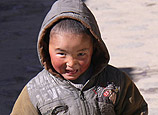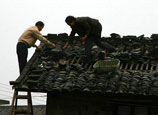
Hard battle
Liu Jianwei said the gemstone factory provided work injury insurance for some workers in order to cope with local social security authority's supervision and checks.
Liu said the employer dismissed all sick employees in 2009 and that had made workers' compensation payments difficult to make.
Workers should provide documentation, including proof of employment, results from health checks and workplace risk evaluations, before they can apply for an occupational disease diagnosis, said Ye Mingxin, an expert with the Beijing Yilian Legal Aid and Study Center of Labor, a non-government organization.
Currently, people claiming to have a work-related disease must follow a medical and legal process, including the occupational disease diagnosis, which takes, on average, at least three years to complete, she said.
It is only after the process is completed that patients can access compensation payments.
"Many employers refuse to hand those documents over, and in many small factories, employers do not keep workers' health records or conduct workplace risk evaluations," she said.
As a result, the process takes a long time, and the treatment for many patients is delayed, she added.
Only 10 percent of employees in China receive regular occupational health services, said Yu Wenlan, a health expert with the Chinese Center for Disease Control and Prevention.
"Based on my field studies in Hunan, Sichuan and some other provinces, the majority of workers with black lung disease have not received compensation because they did not sign an employment contract with their employers and bosses did not buy any insurance for them," said Dai Chun, a labor expert from Central China's Hunan province.
Dai said some local social security authorities lack the motivation to extend work-related injury insurance coverage, which in some ways fosters the malpractice of employers.
"I've learned that some social security departments are worried that they may lose profit in the work injury insurance fund if companies with a high rate of work-related injury incidents pay the insurance for their employees," she said.
Way out
Chen Jingyu, a deputy to the National People's Congress, China's top legislature, submitted a motion to the legislative body urging medical aid for black lung patients during the annual session of the NPC earlier this month. His proposal was signed by 30 other deputies.
Chen, who is also deputy head of the Wuxi People's Hospital in Jiangsu province, said he has seen too many workers stricken by black lung traveling thousands of kilometers, using money they borrowed, in search of a cure.
Chen said he expects the government will give more attention to the plight of workers with black lung disease and take action to help them.
"Our motion calls on the health authority to include black lung disease into the public medical insurance system for residents and ensure that patients can receive reimbursement of at least 70 percent of their medical expenses," he said.
Such measures should be targeted at sick workers who cannot find their former employers or provide employment records, he added.
He also proposed the government provide monthly subsidies for black lung patients since they lose the ability to work and often fall into poverty after they contract the disease.
"Not only do miners run a high risk of contracting the disease. Traffic policemen, workers in gemstone factories and others exposed to dust all face such risk," he said.
"Precautions are important. I hope the government will tighten its supervision on employers so that a safer working environment can be created for workers," he said.
A regulation released by the Ministry of Human Resources and Social Security in 2011 requires its nationwide grassroots bureaus to use the work injury insurance fund to pay workers' medical expenses if their employers did not provide workers' insurance coverage and refused to take responsibility for treatment fees.
Then bureaus can order employers to pay those fees, according to the regulation.
Tang Chun, an expert with China Occupational Safety and Health Association, said farmers-turned-migrant-workers are most vulnerable to occupational diseases such as black lung.
Nearly 29 percent of the 250 million migrant workers in China had work injury insurance by the end of last year, according to the Ministry of Human Resources and Social Security.
"Greater efforts should be made to ensure wider coverage of workers by the insurance," he said.
At the same time, some NGOs are taking action to help black lung patients.
The Pneumoconiosis Assistance Foundation, founded in 2011, has raised more than 6.2 million yuan to cure 608 patients.

















 Romantic like 'The Notebook': 91-year-old illustrator's love leaves Chinese netizens in tears
Romantic like 'The Notebook': 91-year-old illustrator's love leaves Chinese netizens in tears


![]()
